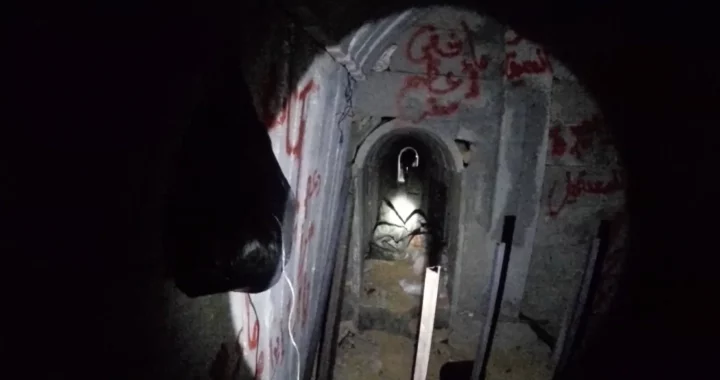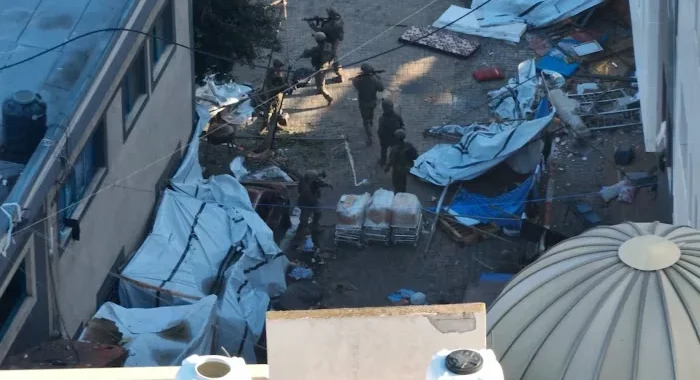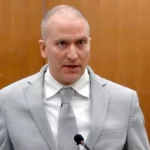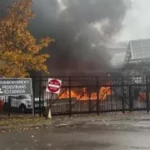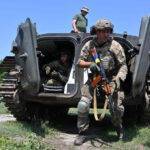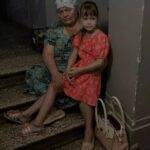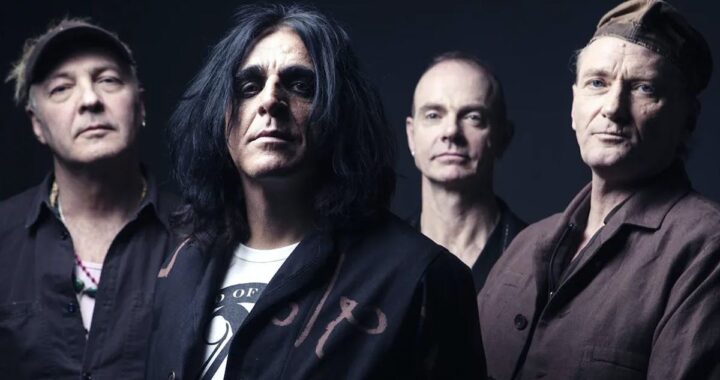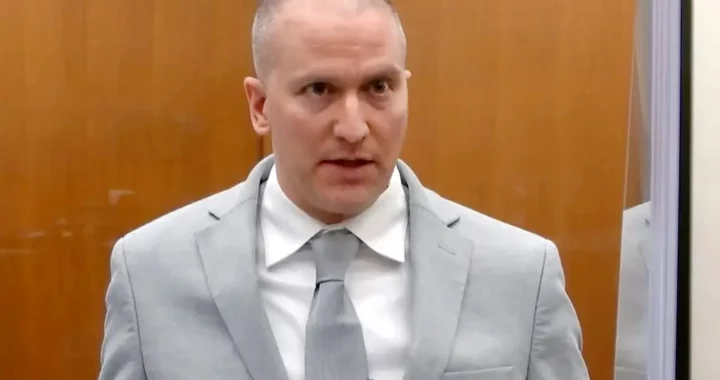Two Russian Soldiers Detains in Connection with Deaths of 9 Civilians
The detention within Ukrainian territory under Russian control represents an unusual acknowledgment by Moscow that its military personnel might have been involved in an offense against Ukrainian civilians. Some analysts cautioned that this move could be driven by political motives.

Russian Soldiers Detained in Connection with Ukrainian Civilian Deaths
In a surprising and rare admission, Russian authorities have detained two of their own soldiers in connection with the killing of nine people, including two children, in Volnovakha, a small city in southeastern Ukraine, which has been under Moscow’s control for over a year now. This shocking incident sheds light on the dark underbelly of the Russia-Ukraine war, where atrocities against Ukrainian civilians have been committed by Russian occupation forces.
The killings, which Ukrainian officials have also reported, occurred last week, and the victims were discovered with gunshot wounds in a house in Volnovakha. However, Russian authorities have been tight-lipped about the details, merely stating that the incident involved a “conflict on domestic grounds.” They have not provided any insight into the possible motive behind the gruesome act. Ukrainian officials, on the other hand, believe that Russian soldiers murdered an entire Ukrainian family for their refusal to surrender their home.
This incident is not an isolated one; rather, it is part of a pattern of brutality inflicted by Russian forces upon Ukrainian civilians over the course of their 20-month invasion. The list of crimes includes public executions, torture of local residents, and the rape of women. However, these heinous acts have often come to light only after the liberation of occupied territories by Ukrainian forces. Moscow has consistently denied any responsibility for such atrocities, maintaining that its soldiers do not target or harm civilians. The fact that Russian authorities are now publicly announcing an investigation into an incident within occupied territory raises a host of questions about their motivations.
Tetyana Katrychenko, the head of the Media Initiative for Human Rights, a group dedicated to investigating Russian crimes in Ukraine, believes that Russian authorities were compelled to announce the investigation because images of the victims began circulating on social networks, putting pressure on occupying forces. Yet, there is skepticism among experts about whether Russian investigators will genuinely seek justice in this case. They caution that the investigation might be a facade intended to create the impression that Moscow is concerned about crimes against civilians.
The Ukrainian prosecutor’s office in the Donetsk region released images of the gruesome murder scene, depicting several people shot dead in their beds, some still locked in an embrace, with blood splattered on the walls. According to their account, Russian soldiers, earlier this month, demanded that the family vacate their house to make room for a Russian unit. When the homeowner refused, they left but returned days later to execute the entire family while they slept.
However, it is essential to note that the Ukrainian prosecutor’s version of events cannot be independently verified, and thus, it becomes even more crucial to establish an unbiased and credible investigation into this horrifying incident.
In line with Ukrainian news organizations, independent Russian news channel ASTRA quoted neighbors of the victims who blamed a Russian serviceman for the massacre. However, the Investigative Committee of the Russian Federation offered only a vague statement, suggesting that the motive behind the crime was a “conflict on domestic grounds.” They have arrested two soldiers from Russia’s Far East who had signed contracts with the Russian military in connection with the murders. The statement also mentioned that “investigative and procedural actions are being taken to establish all the circumstances of the incident.”
Russia has, for the most part, steadfastly denied any responsibility for acts of brutality committed by its soldiers. Even in cases with undeniable evidence, such as the street executions of residents in Bucha, near Kyiv, Russia has resorted to claiming that the images were fabricated. Mikhail Savva, a member of the Kyiv-based Center for Civil Liberties, believes that the investigation into the Volnovakha killings is a rare instance of Russian authorities implicating their own forces in a crime against civilians. However, he contends that this might be a calculated move to feign concern about civilian welfare while ignoring the multitude of other crimes that Russian forces have perpetrated. He asserts that the Russian information campaign surrounding this case is built on the idea that it was a random act by an individual, fitting into their strategy of pretense.
The revelation of this gruesome incident has pierced through the fog of secrecy that usually shrouds the happenings in the Russian-occupied regions of Ukraine. These areas are often inaccessible to international organizations, which has made independent investigations challenging and stoked fears of widespread human rights abuses against the millions of people living there.
The Russia-Ukraine war has exacted a heavy toll on Ukrainian civilians. They have faced the perils of urban warfare, extrajudicial executions, and bombardments targeting civilian infrastructure. The United Nations, in a statement on Tuesday, asserted that it had “reasonable grounds to believe” that a missile strike during a wake, which claimed the lives of nearly 60 civilians earlier in the month, was launched by the Russian military. The total number of civilians killed since the invasion began has reached almost 10,000, according to the United Nations.
In light of these revelations, it becomes evident that the ongoing Russia-Ukraine conflict is not only a geopolitical struggle but also a grim human tragedy characterized by atrocities, violence against civilians, and a blatant disregard for the principles of the Geneva Conventions, which are meant to protect non-combatants in times of war.
The Russia-Ukraine war has already entered its third year, and the toll it has taken on both sides, particularly on Ukrainian civilians, is deeply unsettling. Despite international condemnation and sanctions, the conflict continues to claim lives, disrupt communities, and sow the seeds of hatred and discord. The recent incident in Volnovakha is a stark reminder that innocent civilians are the ones who suffer the most in this conflict.
The Geneva Conventions, a set of international treaties and protocols, are designed to safeguard the rights and well-being of civilians and combatants who are no longer taking part in the hostilities. These conventions establish the rules for the treatment of prisoners of war, the protection of civilians, and the prohibition of acts that could cause harm to non-combatants. However, the actions of Russian occupation forces, as highlighted by this recent incident, indicate a blatant disregard for these principles.
Atrocities like the family murder in Volnovakha have become all too common in areas under Russian control. Reports of executions, torture, and rape have painted a disturbing picture of life for many Ukrainian civilians. The denial and cover-up of these crimes by Moscow have only exacerbated the suffering of the victims and their families. It is high time that the international community takes stronger action to hold Russia accountable for these war crimes and human rights violations.
The recent admission by Russian authorities to investigate this specific incident may be seen as a step in the right direction. However, as experts and human rights organizations have rightly pointed out, there is skepticism regarding the sincerity of this investigation. It may be a calculated move to appease international pressure and create the illusion of accountability while avoiding scrutiny for the broader pattern of abuses committed by Russian forces.
In this context, the role of international organizations and the United Nations becomes crucial. They must exert pressure on Russia to ensure a transparent and credible investigation into this incident. Moreover, access to the occupied territories is essential for independent monitors and investigators to document the extent of the abuses and hold the perpetrators accountable.
The neologism “fake news” has been widely used in recent years, and it is a term that is relevant to this discussion. In an era where disinformation and propaganda spread rapidly through social media and other channels, it is imperative to rely on credible sources and verified information. The international community and the public must be vigilant in discerning the truth from falsehoods, especially when it comes to conflicts like the Russia-Ukraine war, where information is often weaponized to serve political agendas.
It is also vital for world leaders and diplomats to prioritize the resolution of the Russia-Ukraine conflict. The longer this war drags on, the more civilians will suffer, and the greater the potential for further atrocities. Diplomatic efforts should be redoubled to seek a peaceful resolution to the conflict and to ensure the protection of Ukrainian civilians.
Russian President Vladimir Putin, as the leader of the country responsible for the actions of its military, bears a significant responsibility in this regard. The international community should hold him accountable for the actions of Russian forces in Ukraine and push for a comprehensive and lasting peace agreement that respects the rights and security of all Ukrainians.
The term “genocide” is not one to be used lightly, but it is essential to examine the situation in Ukraine within the framework of international law and the Geneva Conventions. While the term genocide may not apply to the conflict as a whole, the systematic targeting and abuse of Ukrainian civilians by Russian occupation forces raise serious concerns. The international community should consider the possibility of classifying these actions as crimes against humanity or war crimes, which carry serious legal consequences.
In conclusion, the family murder in Volnovakha is a tragic reminder of the ongoing suffering of Ukrainian civilians in the Russia-Ukraine war. It is an illustration of the brutal reality faced by those living in areas under Russian control and the urgent need for accountability and justice. The international community, with the United Nations at its forefront, must press for a thorough investigation into this incident and insist on access to the occupied territories for independent monitors. The rights and safety of Ukrainian civilians should be at the forefront of all diplomatic efforts to resolve the conflict and put an end to the cycle of violence and suffering.
By: M Z Hossain, Editor Sky Buzz Feed

